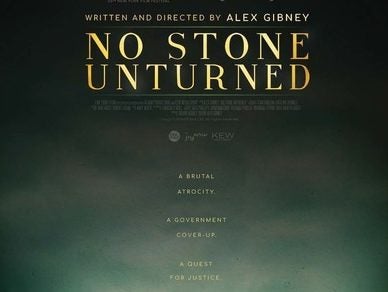
Press freedom groups have expressed their “worry” over the arrest of two investigative journalists in Northern Ireland in connection with the alleged theft of secret documents from the regional police ombudsman.
Trevor Birney and Barry McCaffrey were held for questioning by police in Belfast on Friday last week, but have since been released on bail.
The pair worked on documentary film No Stone Unturned, with Birney as producer and McCaffrey as a journalist, about the Loughinisland massacre in which six people were killed in a bar by loyalist gunmen on June 18 1994.
The documents, which the police ombudsman said had been in their custody, are understood to relate to an ongoing police probe into the murders, which took place during a World Cup football game.
A spokesperson for the police ombudsman has said the suspected theft of the documents could “put lives at risk”.
No Stone Unturned caused controversy when it was released in November last year by naming one of the suspected gunmen, according to the Belfast Telegraph.
It also examined claims of police collusion in helping the killers to evade justice.
The documentary’s writer and director, Alex Gibney, said on Twitter that Birney and McCaffrey had been arrested “for doing good, hard-hitting journalism”, adding it was: “outrageous”.
Alert: @trevorbirney my producer on "No Stone Unturned," and journalist @Barry_TheDetail have just been arrested in Belfast, NI, for doing good, hard-hitting journalism. Outrageous. Raise ruckus. I am traveling. More later. https://t.co/gOAunwqrxA
— Alex Gibney (@alexgibneyfilm) August 31, 2018
Seamus Dooley, acting general secretary at National Union of Journalists in Ireland, said it was “deeply worrying” that the police attention is on the journalists “rather than on the issues raised in the documentary”.
He said: “The protection of journalistic sources of confidential information is of vital importance and journalists must be free to operate in the public interest without police interference.
“These journalists are entitled to claim journalistic privilege and to seek the protection of the legal system if there is any attempt to force them to reveal sources.”
The NUJ said computers and data held by both men had been confiscated.
Said Dooley: “Every step must be taken to ensure that data held on computers is not compromised and that the confidentiality of the sources are not put in jeopardy.
“Journalists throughout the UK and Ireland will support Trevor and Barry in any stand they take to lawfully protect their confidential sources.
“It is profoundly depressing to note that, yet again, priority appears to be given to tracking down the source of journalistic stories rather than solving murders in Northern Ireland.”
Human rights charity Amnesty International also expressed their concern over the message the arrests send to other investigative journalists in the region.
Northern Ireland programme director Patrick Corrigan at Amnesty International, said: “Few subjects could be more significant public concern than the mass shooting of civilians and the alleged collusion of the police in assisting those responsible to evade justice.”
Brian Gormally, director of human rights group the Committee on the Administration of Justice, which is based in Belfast, said: “The arrest of journalists because of their work is always a concern, particularly when it relates to those who uncover evidence of human right violations, who are entitled to protect their sources.”
He pointed to article ten (freedom of expression) of the European Convention on Human Rights which protects the right of journalists to find, collect and use secret information.
Email pged@pressgazette.co.uk to point out mistakes, provide story tips or send in a letter for publication on our "Letters Page" blog
